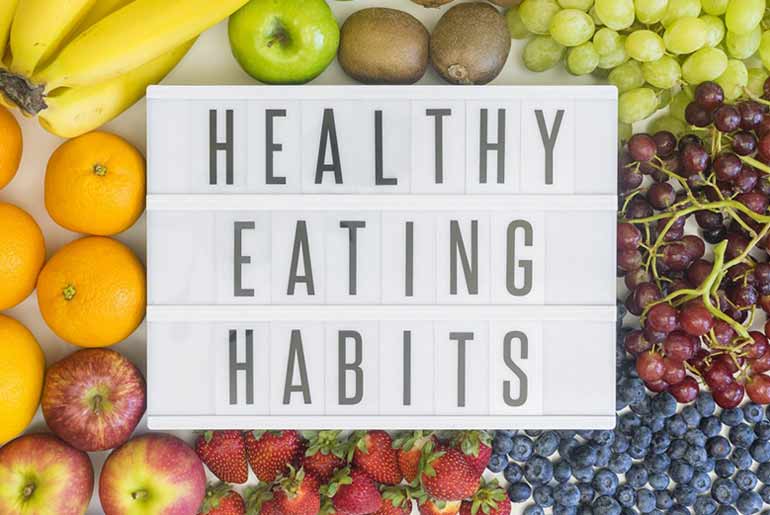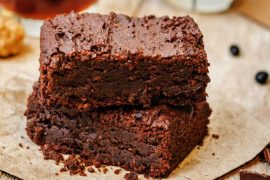Healthy eating habits are the necessity of everyone who wants to stay away from disease and wants to keep fit.
Eating habits make you fit and active. We all know these facts, but how much do we care or follow?
We ignore our healthy eating habits and don’t care about them. We make excuses for not having much time. But it’s an injustice that we do to ourselves.
We always ignore our health plans and healthy diets. So let’s first talk about healthy eating habits in a natural pattern.
Adopt a healthy food eating pattern that accounts for all foods and beverages within an appropriate calorie level.
A healthy eating pattern consists:
• A diversification of vegetables from all of the subgroups—dark green, red and orange, legumes (beans and peas), starchy, and other
• Fruits, especially whole fruits
• Grains, minimum half of which includes whole grains
• Fat-free dairy products include milk, yogurt, cheese, paneer, and nutritional soy beverages.
• A diversification of protein foods, including seafood, lean meats and poultry, eggs, legumes (beans and peas), and nuts, seeds, and soy products
• Oil and fats
A healthy eating pattern limitations:
• Saturated fats and added sugars, trans fats, and sodium are also necessary.
Key factors that are quantitative are provided for several segments of the diet that should be not crossed. These components are particularly for public health concern in India, and the specified restrictions can help individuals to achieve healthy eating patterns within advised calorie limits:
• Intake of less than 10 percent of calories per day with added sugars.
• Consume less than 10 percent of calories per day from saturated fats.
• Intake of fewer than 2,300 milligrams (mg) per day of sodium is advised.
• If you consume alcohol, it should be in restraint—up to only one drink per day is permissible for women and up to two drinks per day are permitted for men—and that too exists only by adults of legal drinking age.
Let’s now move on to healthy eating habits in 2020. You must focus on keeping yourself fit and healthy.
1. Have a rainbow.
Every fruit and vegetable has a variety of colors that are based on various minerals, vitamins, phytochemicals, and antioxidants. Brigitte Zeitlin, M.P.H., R.D., C.D.N., founder of the New York-based BZ Nutrition, tells SELF. The more colors you paint your plate with, the more variation you’re getting nutrient-wise. Also, it keeps things interesting, so you don’t get bored.
2. Try new food items
We seem to eat the same foods repeatedly. This limits our nutritional range. Be adventurous. Have new foods. You might just discover a new favorite you’ve been missing all this time.
3. Pay attention to your food
“Mindful eating is paying more attention to how you eat, being more present to make better food choices,” Albers says. It’s “like laying a strong foundation of a house,” she explains. “If you get the mindful eating down, you will have an easier time creating new habits.” Stop eating in front of the TV or computer, put down all distractions, and actually pay attention to what you’re putting on your plate and in your mouth. You’ll feel more satisfied, stop eating when you’re truly full, and eventually make healthier choices.
4. Eat slowly
Rest before taking a bite and chew slowly. This will help you bring your attention back to the task eating and keep you from mindlessly scarfing down more than your body wants or requires.
5. Discover better ways to manage stress and anxiety
Stress eating is eventually a bad habit for many people. By discovering other ways to cope with stress and anxiety, you’ll slowly stop turning to food for comfort. Whether it’s reading a good novel, getting a spa, cooking, going for a walk, or whatever else helps you blow off some steam and regroup. Find something that enables you to release your stress other than food.
6. Go through the ingredient information
The only way you’ll finally cut back on added sugar or eat less sodium, whatever your specific healthy-eating ambition, is if you know what’s in the food you’re consuming. Packaged foods we buy at the grocery store can have a lot of unnecessary ingredients. Jackie Baumrind, M.S., C.D.N., a dietitian at Selvera Wellness, reveals buying foods with a shortlist so that you’re eating the nutrients that are naturally in foods an excellent way to stay within healthy restrictions of things like fat, carbs, and sugar.
7. Cook more eat more
The best way to know what’s in your food? By making it yourself. You can also better control your portion sizes “If you serve yourself, you tend to eat less,” Baumrind tells SELF. She suggests playing around with spices to create flavorful dishes you love with less sugar and salt than you’d find at a restaurant.
8. Develop a daily routine
“This way, you click into doing it even when you don’t feel like it,” Albers says. Eat meals around the same times every day, or dedicate Sunday mornings to meal prep. Once it becomes routine, it’ll come more naturally.
9. Enter your kitchen again
Put treats out of sight and off the counter. Put a fruit bowl right on the table. A “mindful makeover” will help prevent cravings and give you a chance to really decide what your body wants and needs.
10. Don’t leave yourself starving
We all know how this happens. We get wrapped up in work, stress, or kids, or whatever else is distracting us, and before you finally relize, it’s 3 P.M. and you haven’t eaten since 8 A.M. When we’re ravenously hungry, we give into not-so-healthy cravings, or binge on more than we need because our brains continuously telling us to EAT. By planning out meals and snacks throughout the day, you can prevent this from happening.
So these are some healthy eating habits that you can opt as your new year pledge and work upon to stay fit and away from diseases. You should follow these healthy eating habits on a daily basis to get the best results and desired results.
Stay fit. Eat healthily.
Disclaimer:
The information contained in this article is for educational and informational purposes only and is not intended as a health advice. We would ask you to consult a qualified professional or medical expert to gain additional knowledge before you choose to consume any product or perform any exercise.






